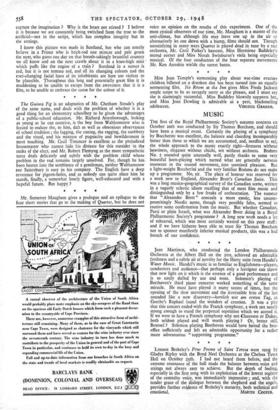MUSIC
THE first of the Royal Philharmonic Society's autumn concerts on October zoth was conducted by Sir Thomas Beecham, and should have been a musical event. Certainly the playing of a symphony by Boccherini was excellent, the balance and chording incomparably better than those to which we are accustomed, and, needless to say, the whole approach to the music exactly right—firmness without • heaviness, elegance without chichi, wit without archness. Braluns No. 2 sounded quite unusually well, partly thanks to some very beautiful horn-playing which turned what are generally nervous moments in the second movement,; into unmixed pleasure. But a light-weight Boccherini and the very familiar Brahms do not make up a programme. No, sir. The place of honour was reserved for a work new to England, Alexander Brott's Canadian Suite. This was a long musico-geographical survey of the Canadian scene, written in a vaguely eclectic idiom recalling that of most film music and distinguished only by a few freaks of orchestration. The rumour that "Alexander Brott " conceals a more exotic, less uncom- promisingly Nordic name, though very possibly false, seemed to receive some confirmation from the music. But whether Canadian, Parsi or plain Israeli, what_ was Alexander Brott doing in a Royal Philharmonic Society's programme ? A long new work needs a lot of rehearsal, which was most certainly wasted on this poor stuff: and if we have hitherto been able to trust Sir Thomas Beecham not to sponsor manifestly inferior musical products, this was a bad breach of our confidence.
Jean Martinon, who conducted the London Philharmonic Orchestra at the Albert Hall on the 2rst, achieved an admirable freshness and a subtle air of novelty for the Harty suite from Handers Water Music. Handel's music is so familiar to Englishmen—players, conductors and audience—that perhaps only a foreigner can throw that new light on it which is the essence of a good performance and is so easily dulled by use and wont. Solomon's playing of Beethoven's third piano concerto worked something of the same miracle. He must have played it many scores of times but the opening of the slow movement and the irresistible brio Of the last sounded like a new discovery--herriich wie am ersten Tag, as Goethe's Raphael found the wonders of creation. It was a• pity that this concert ended with the Franck symphony, a work not nearly strong enough to stand the perpetual repetition which we accord it. If we were to have a French symphony why not Chausson or Dukas, both seldom played and well worth playing ? Or, better still, Roussel ? Solomon playing Beethoven would have baited the box- office sufficiently and left an admirable opportunity for a rather more adventurous "supporting programme."
Lennox Berkeley's Four Poems of Saint Teresa were sung by Gladys Ripley with the Boyd Neel Orchestra at the Chelsea Town Hall on October isth. I had not heard them before, and the extreme resonance of the hall made the balance betweenvoice and strings not always easy to achieve. But the depth of feeling, especially in the first song with its exploitation of the lowest register of the contralto voice, was immediately impressive; and,' with the tender grace of the dialogue between the shepherd and the angels, provides further evidence of Berkeley's maturity, both technical and


































 Previous page
Previous page